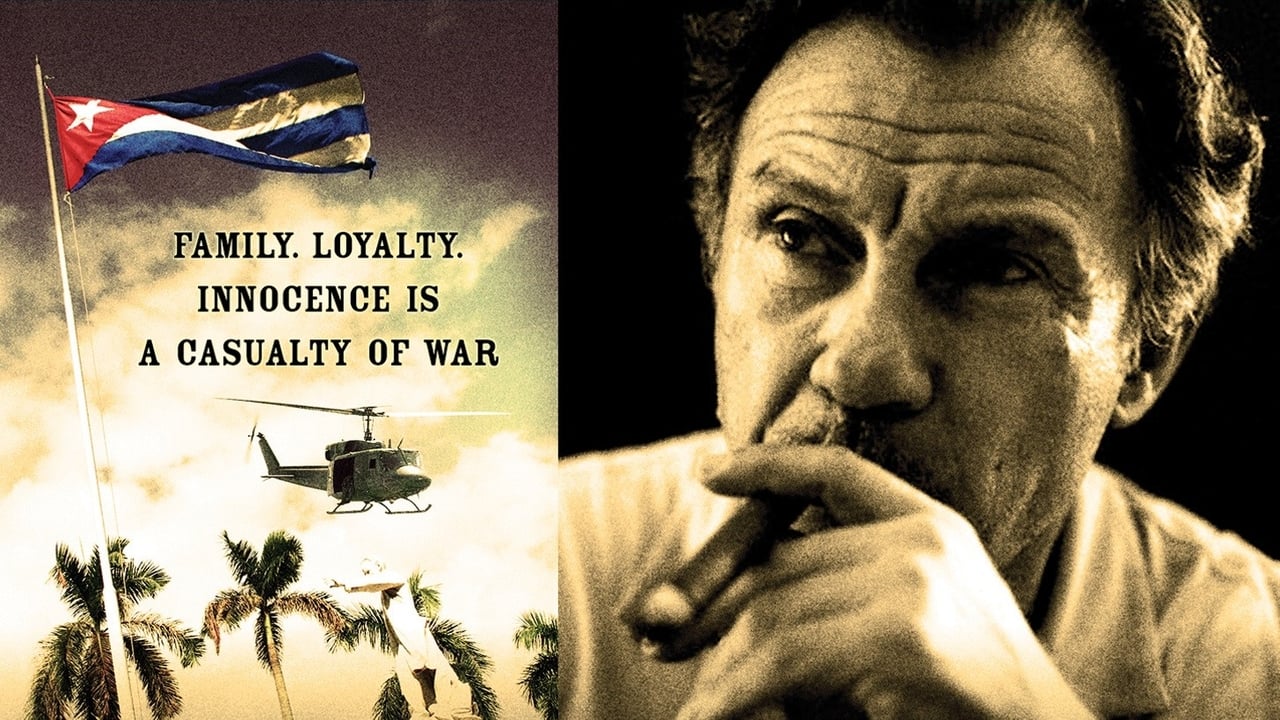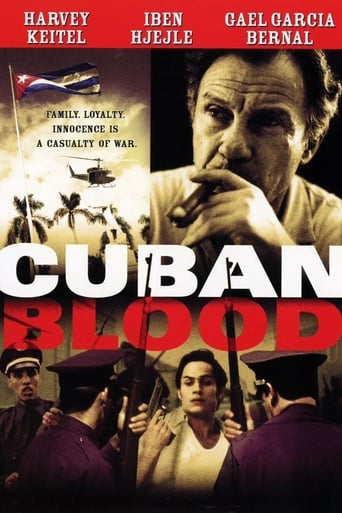

This is How Movies Should Be Made
... View Morejust watch it!
... View MoreA Brilliant Conflict
... View Moren my opinion it was a great movie with some interesting elements, even though having some plot holes and the ending probably was just too messy and crammed together, but still fun to watch and not your casual movie that is similar to all other ones.
... View MoreThis film is a lyrical and romantic memoir told through the eyes an eleven year old boy living in a rural Cuban town the year of the Castro revolution. It is an obviously genuine worthy labor of love. The names CUBA LIBRE and CUBAN BLOOD are merely attempts to wrongly market this as an action film. DREAMING OF JULIA makes much more sense. It has more in common with European cinema than with RAMBO and the revolution is merely an inconvenience to people's daily lives and pursuits. That fact alone makes the film more honest than most works dealing with this time period in Cuban history.The excessive use of the voice-over narrator does undermine the story but the film makes up for it with unqualified clips from Hollywood films that say so much more visually than the narrator could.The comparisons to CINEMA PARADISO and are fair game as the film does wax melancholy about movies, but there is an underlying pain at the loss of a lifestyle that surpasses lost love. The revolution, like the film JULIE, never seems to have an ending.
... View MoreHarvey Keital's best performance so far the new century. Very nicely photographed, a beautiful snap-shot of pre-Castro Cuba. The story revolves around the nephew of a local minor crime boss who develops a friendship with an American with Hollywood connections. It's really about the moment when a boy awakens to the fact that the small circle of people he knows actually live in a much larger, much more complex world that he doesn't yet understand.the script is strong and filled with humor, the direction is crisp. Over all, a really professional job that fits in well with the tradition of Latin American cinema. The one weakness is the decision to shoot in sync-sound English rather than Spanish - probably to improve sales in the US. Unfortunately, this just makes the film a little less convincing. But if you can see beyond this, you will find a heartfelt trip to another world. Recommended.
... View MoreAlthough some may call it a "Cuban Cinema Paradiso", the movie is closer to a How Green Was My Valley, a memory film mourning for a lost innocence. The film smartly avoids falling into a political trap of taking sides (pro-Castro? anti-Castro?, focusing instead in the human frailty of the characters and the importance of family. Filled with good acting, in particular from Mexican actress Diana Bracho, who plays Keitel's wife. A masterpiece, filled with references to classic movies, from CASABLANCA to Chaplin's CITY LIGHTS. Gael Garcia Bernal plays a small role which is critical for the dramatic payoff of the story. TV director Georg Stanford Brown, in a rare return to acting (remember THE ROOKIES?), plays a homeless bum who acts as Greek chorus, superbly. It is a pity that this movie, originally titled DREAMING OF JULIA, has been released in the States by THINKfilm with the atrocious title of CUBAN BLOOD, which has nothing to do with the movie.
... View MoreCUBAN BLOOD, a direct to DVD little film, has a long history. Shot in the year 2000 in the Dominican Republic as the first film for director/writer Juan Gerard (with writing assistance from Letvia Arza-Goderich) the film began as a 3 1/2 epic about the small town of Holguín, Cuba in the year 1958, a place where the Bautista/Castro clash was not as evident as in Havana. Originally named DREAMING OF JULIA (referencing both the sole entertainment for the little town - a movie house - as well as the sole Americana Julia who plays a significant pivotal role in the story), the film was next called CUBA LIBRE and finally titled (rather inappropriately CUBAN BLOOD. Juan Gerard has yet to make another film and one can understand why.Holguín is a pretty, peaceful town whose patriarch is Che (Harvey Keitel - and the Che is an old grandfather, not the revolutionary), married to Beta (the very talented and dignified Mexican actress Diana Bracho), who are the beloved grandparents of the little boy (Andhy Méndez) whose story this film is as narrated by off screen mature Tony Planas. The impending revolution results in a loss of power for the town and the story is a simple coming to grips with the changes that are to be inevitable. The boy meets the Americana Julia (Iben Hjejle) who befriends him; he struggles with the town youths who mimic him as a chicken; he dotes on movies he watches with his grandmother Beta; he falls in love with the older Carmen (Farah Alfonseca) who in turn is in love with a quiet revolutionary sympathizer Ricky (Gael García Bernal in his second film after his debut in AMORES PERROS); he learns of Che's infidelity to Beta; and he watches the town and his family disperse with the coming of Fidel Castro's revolution. Seeing the events of 1958 through the eyes of a child is enchanting and for the most part makes for a sweet, though saccharine, film.Cinematographer Kramer Morgenthau takes terrific advantage of the 'year without electricity' motif and makes most of the film shot at night with candles and lanterns creating a storybook loveliness that heightens the romantic aspect of this film. Perhaps in the original 3 1/2 hour version there were better character developments - especially in the case of Gael García Bernal's very small but pivotal role, and in the use of Georg Stanford Brown as a Greek Chorus 'Black Bum' who seems to be placed to make the events unfold with some sense of order.The supporting cast includes some strong actors: Gabino Diego, Cecilia Suárez, Aline Küppenheim, Daniel Lugo, etc whose roles were no doubt better fleshed out in the original. But it is clearly the influence of Harvey Keitel that helped Juan Gerard make this film happen. It has moments but it too often falls into the novella melodrama realm to make it work for audiences trying to figure out whether this is an historic drama or a Cuban version of 'Cinema Paradiso'-type Italian films. Grady Harp
... View More